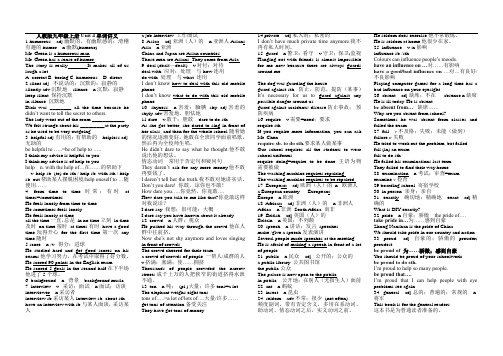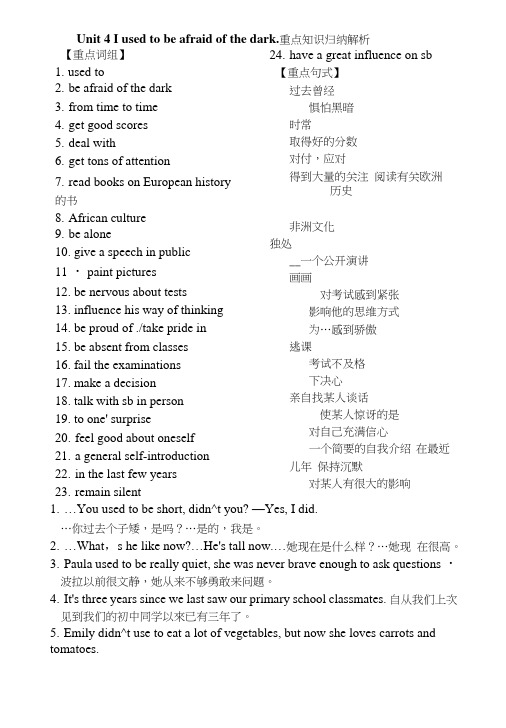人教版英语初三Unit4讲义.doc
- 格式:doc
- 大小:177.50 KB
- 文档页数:23


人教版九年级上册Unit 4单词讲义1.humorous adj.幽默的,有幽默感的;滑稽有趣的humor n.幽默(humour)Mr. Green is a humorous man.Mr. Green has a sense of humor.The story is really . It makes all of us laugh a lot.A. correctB. boringC. humorousD. direct2.silent adj. 不说话的;沉默的;寂静的silently adv.沉默地silence n.沉默;寂静keep silent 保持沉默in silence 沉默地Dick was ________ all the time because he didn’t want to tell the secret to others.The lady went out of the room ____________. We felt strange about his _________at the party as he used to be very outgoing.3. helpful adj.有用的;有帮助的helpless adj.无助的be helpful to …..=be of help to …..I think my advice is helpful to you.I think my advice is of help to you.help n. with the help of…在……的帮助下v. help sb. (to) do sth./ help sb. with sth./ help sb. out帮助某人摆脱困境/help oneself to …随便用……4. from time to time 时常;有时at times=sometimesHe feels lonely from time to time.He sometimes feels lonely.He feels lonely at time.all the time一直,总是in no time立刻in time 及时on time按时at times有时have a good time玩得开心for the first time第一次any time随时5.score n./v. 得分;进球He studied hard and got good scores on his exams.他学习努力,在考试中取得了好分数。


Unit4 I used to be afraid of the dark.学习目标1. 能够掌握本单元重点单词和句型的用法;2. 能够掌握used to的相关用法;3. 能够灵活运用已学内容介绍身边的人或事物的今昔变化;学习地图课中讲解一、词汇知识讲解1.humorous adj. 幽默的humor n. 幽默a sense of humor 幽默感【拓展】形容词后缀-ous:serious/dangerous/delicious/famous/nervous2.silent adj. 沉默的be / keep silent 保持沉默silently adv. 沉默地silence n. 沉默in silence 沉默= silently【拓展】3.help v. 帮助help sb.(to) do sth. 帮助某人做某事help sb. with sth. 在某方面帮助某人help sb. outn. 帮助with one’s help= with the help of sb. 在某人的帮助下e.g. With the help of his mom, we successfully made a birthday cake for the first time.在他妈妈的帮助下,我们第一次成功地做了一个生日蛋糕。
helpful adj.有帮助的— helpless adj.没有帮助的can’t help doing 情不自禁做某事【拓展】形容词-ful / -less后缀:useful – useless; meaningful – meaningless; careful – careless; hopeful – hopeless; harmful – harmless;4.from time to time 时常;有时= at times = sometimese.g. After sitting for a long time, you should clap your hands and move your arms and legs from time to time.久坐之后,你应该时不时地拍拍手,活动活动你的手和胳膊。

Unit4 I used to be afraid of the dark.1.What’s he like now?结构: What’s +sb./sth.+like? 某人/某物什么样?表示某人/某物什么样的句型:人:①What’s+人+like? 询问性格/外貌②What does/do +人+look like? 询问外貌③How+be +人? 询问身体状况物: ①What’s +物+like?②What does/do +物+look like?③How+be+物?以上都是询问属性、形状、大小或质量等Eg:-What’s your new bike like?=How’s your new bike?-Very good.2.This party is such a great idea!Such (adj)那么的;这样的辨析: such与soSuch是形容词,修饰名词/名词短语①such+a(n)+(形容词+)单数可数名词Eg: such a (good) holiday②(形容词+)复数可数名词Eg: such (beautiful) girls③(形容词+)不可数名词Eg: such (delicious) foodSo是副词,修饰形容词/副词Eg: so careful so carefully注意: 当名词前有many,much,few,little 等词修饰时,只能用so,不能用such.Eg: She will have so much housework to do tomorrow Such+a(n)+adj+可数名词单数=so+adj+a(n)+可数名词单数Eg:It is so interesting a book that I like it very much. It is such an interesting book that I like it very much.3.As she got better,she dared to sing in front of her class,and then for the whole school.dare (实义动词) 敢于;胆敢(可以有词形变化) Eg: I wonder how he dares to say such things.dare(情态动词) 敢(通常用于疑问句/否定句及if/whether之后,一般不用于肯定句)Eg:Dare you tell her the truth?I don’t know whether he dare try.“I dare say”习惯说法(用于肯定句) 所表示的是一种不确定的语气,常译为:很可能、大概、我想等Eg: I dare say you are right. 我想你是正确的4.Now she’s not shy anymore and loves singing in front of crowds.Not...anymore=not...any more 相当于no more(一般指行为/动作不再出现)辨析: not...any more 与not...any longernot...any more 相当于no more,表示数量和程度上的“不再”,通常修饰非延续性动词,一般指今后“不再”,故多用于将来时Eg: He will not go there any more.He will no more go there.not...any longer 相当于no longer 指时间上/距离上的“不再延长”,通常修饰延续性动词,多指现在的情况与过去相比,故常用于现在时态Eg: You can’t stay here any longer.You can no longer stay here.5.You really require a lot of talent and hard work to succeed.require (v) 需要;需求requirement (n)要求;规定用法如下:①require sb.to do sth. 要求某人做某事②require that+sb.(should) do sth. 要求某人做某事③sth. require doing /to be done.某事需要(被)做6.Only a very small number of people make it to the top.a very small number of 极少数后接复数名词(谓语动词用复数形式) a small number of 少数辨析: a number of 与the number ofa number of +复数名词许多the number of +复数名词...的数量(谓语用单数) 7.Sometimes he was absent from classes and failed his examinations.absent (adj) 缺席的;不在场的(常与from连用) be absent from 缺席absence (n) 缺席(反义词: presence )present(adj)出席的;在场的(后置定语)(adj)目前的;现在的(前置定语)fail (vt) 失败;不及格(vi) 失败;不及格~ to do sth. 未能/没能做成某事Eg: The boy didn’t fail (in) the exam.8.She advised them to talk with their son in person. advise sb. (not) to do sth. 建议某人(不)做某事advise的用法如下:①~doing sth. 建议做某事②~ that +从句建议... (that引导的从句应用虚拟语气,即:should+动原,should可以省略)advice(un) 建议;忠告 a piece of advice 一条建议9.So he became less interested in studying and missed classes.辨析: become,turn与getbecome:变得;成为(通常指身份、职位的变化,强调变化的过程已完成)Eg: She became an English teacher.turn: 变成(多用于在颜色或性质等方面的变化,强调变化的结果)Eg: The man turned blue with fear. (那个人吓得脸色发青)get:变得(多用于口语,表示一种变化过程,强调“渐渐变得”, 其后常接adj的比较级)Eg: In winter,the days get shorter.Used to的用法:used to+动原表示过去的习惯性动作或状态,现在已不再发生或不存在.否定句: used not to, usedn’t to, didn’t use toEg: She didn’t use to have long hair.She usedn’t to have long hair.一般疑问句: Did e to...? /Used sb.to...?Yes,sb.did. /Yes,ed to. No,edn’t 反意疑问句: 附加问句部分可用didn’t/usedn’t类似短语:be/get/become used to doing sth.习惯于做某事be used to do sth. 被用于做某事。

Unit 4 I used to be afraid of the dark.重点知识归纳解析【重点词组】ed to2.be afraid of the dark3.from time to time4.get good scores5.deal with6.get tons of attention7.read books on European history 的书8.African culture9.be alone10.give a speech in public11 ・ paint pictures12.be nervous about tests13.influence his way of thinking14.be proud of ./take pride in15.be absent from classes16.fail the examinations17.make a decision18.talk with sb in person19.to one' surprise20.feel good about oneself21.a general self-introduction22.in the last few years23.remain silent 24.have a great influence on sb 【重点句式】过去曾经惧怕黑暗时常取得好的分数对付,应对得到大量的关注阅读有关欧洲历史非洲文化独处__一个公开演讲画画对考试感到紧张影响他的思维方式为…感到骄傲逃课考试不及格下决心亲自找某人谈话使某人惊讶的是对自己充满信心一个简要的自我介绍在最近儿年保持沉默对某人有很大的影响1.…You used to be short, didn^t you? —Yes, I did.…你过去个子矮,是吗?…是的,我是。
2.…What,s he like now?…He's tall now.…她现在是什么样?…她现在很高。
人教版新目标unit4指导讲义IndividualTeachingDesignforEnglishKnowledgeReviewofUnit4TeachingContentTeachingObjects StudentcanmasterthekeypointsfromthisclassImportantPoints StudentcanmasterthekeypointsfromthisclassDifficultPoints StudentcanmasterthekeypointsfromthisclassTeachingAids exercisesTeachingProceduresRevisionErrorsPresentationContentUnit4Iusedtobeafraidofthedark.一、短集edto__________________2.害怕黑暗___________________3.fromtimetotime_________________4.getgoodscores_________________5.,理______________________tonsofattention______________7benervousabout__________________8.⋯感觉傲__________/___________9.作一个演_________________10.缺席__________________11.下信心_____________12..talkwithsbinperson__________________ 13.使某人惊的是______________14.保持缄默.______________________15.不再__________________16.敢于做某事____________________三、知点梳理—Mario,youusedtobeshort,didn’tyou?里奥,你从前个子矮,?—Yes,Idid.是的。
重点短语1.keep silent=be in silence2.Take up doing 从事.../开始做...3.Make it成功的完成例句:I believe you can make it. 我相信你一定能取得成功。
4.Require sb. to do 需要某人去做某事5.Succeed in doing 成功做某事。
6.All the time辨析与time有关的短语1.on time准时(在规定的时间内完成某个动作)The train arrives on time. 火车准时到达2.in time及时If you run, you may be in time for the bus. 如果你跑的话,你也许还来得及赶上那辆公共汽车3.at times 有时,时常Mary goes to the zoo at times. 玛丽有时去动物园。
4.all the time 总是Look!The monkeys are running and jumping all the time.看!那些猴子总是蹦来蹦去。
5.in no time 立刻,很快The computer can easily work out the problem in no time. 计算机可以轻松自如地立刻解答这个问题。
6.at a/one time 一次,每一次Hand them to me, two at a/one time. 把他们交给我,每次两个。
7.at the same time 同时See you tomorrow at the same time. 明天同一时间见。
8. at this time of day 在一天中的这个时间The shop is open at this time of day. 这个商店在一天的这个时间开门营业。
9. once upon a time 从前,很久很久以前Once upon a time, there lived an old man named Yu Gong. 很久很久以前,有一位名叫愚公的老人。
Unit 4 I used to be afraid of the dark.1. *humorous /hju:mərəs/ adj.有幽默感的;滑稽的 humor n 幽默 a sense of humor 幽默感2.silent /'saɪlənt/ adj. 不说话的;沉默的4. from time to time时常;有时 =once in a while5. *score /skɔ:( r)/ n. & v. 得分;打分 grade 成绩 mark 分数6. *background /'bækgraʊnd/ n. 背景7.*interview /'ɪntə (r)vju:/ v. 采访;面试 n.访谈 have an interviewinterviewer n 面试者;访谈者8. *Asian /'eɪʃn/,/'eɪʒn/ a. 亚洲(人)的; n. 亚洲人9. deal /di:l/ v. (dealt /delt/,dealt) 对付;对待--dealt --dealt10. shyness /'ʃaɪnəs/ n. 害羞;腼腆11. dare /deə/,/der/ v. 敢于;胆敢 dare to do 敢于做某事 dare 可用作情态动词 dare do12.*crowd /kraʊd/ n. 人群;观众13. ton /tʌn/ n. 吨;(pl)大量;许多14. private /'praɪvət/ adj. 私人的;私密的 personal 个人的 in person 亲自 private car 私家车15.*guard /gɑ:(r)d/ n. 警卫;看守v. 守卫;保卫(guards ) guard against 防止;提防16. require /rɪ'kwaɪə(r)/ v. 需要;要求*African /'æfrɪkən/ adj. 非洲(人)的 n. 非洲人*British /'brɪtɪʃ/ adj. 英国的;英国人的18. *speech /spi:tʃ/ n. 讲话;发言 19.public /'pʌblɪk/ n. 民众 adj.20.*ant / ænt/ n. 蚂蚁21.*insect /‘ɪnsekt/ n. 昆虫22.seldom /'seldəm/ adv. 不常;很少be absent from 缺席=be away from25. fail /feɪl/ v. 不及格;失败;未能(做到)fail to do做某事失败26.examination /ɪgzæmɪ'neɪʃn/ n. 考试;审查exam n/v 考试;检查27.*boarding school /'bɔ:(r)dɪŋ/ 寄宿学校28.exactly /ɪg'zæktlɪ/ adv. 确切地;精确地29. pride /praɪd/ n. 自豪;骄傲take pride in 为⋯⋯感到自豪proud /praʊd/ adj. 自豪的;骄傲的be proud of 为⋯⋯骄傲;感到自豪30.*general /'dʒenrəl/ a. 普遍的;总的n. 将军generally adv 一般;普遍in general 总的来说=generally speaking31. *introduction /ˌɪntrə'dʌkʃn/ n. 介绍introduce v 介绍self-introduction 自我介绍【辨析】instrument n 器械instruction n 说明;指示①used to do 过去常常做某事didn't use to do过去不做某事过去我常常和我哥哥一起弹钢琴。
授课题目教学设计学习目标教学重难占八、1 .谈论过去的自己及周围的事物,与现在进行比较,学会表述所发生的变化。
2.掌握used to +动词原形,以及该句型相关的句型转换(一般疑问句,否定句)掌握used to +动词原形,以及该句型相关的句型转换(一般疑问句,否定句)Unit4.l used to be afraid of the dark.课程新授一、温习(复习提问)第三单元教案习题讲解二、学习新课(自主探究学习)重点词汇humorous, silent, helpful, from time to time, score, interview, Asian, deal with, shyness, dare, crowd, private, guard, require, European, African, British, speech, in public, seldom, influence, absent, fail, examination, exactly, pride, proud, general, introduction 重点短语1-keep silent=be in silence2, Take up doing从事…/开始做…3. Make it成功的完成例句:I believe you can make it 我相信你一定能取得成功。
4. Require sb. to do需要某人去做某事5.Succeed in doing 成功做某事。
6. AII the time辨析与time有关的短语1. on time准时(在规定的时间内完成某个动作)The train arrives on time. 火车准时到达2. in time 及时If you run, you may be in time for the bus. 如果你跑的话,你也许还来得及赶上那辆公共汽车3. at times有时,时常Mary goes to the zoo at times.玛丽有时去动物园。
4. all the time 总是LookIThe monkeys are running and jumping all the time.看!那些猴子总是蹦来蹦去。
5. in no time 立刻,很快Th e comput e r can ea s il y work out th e prob le m i n RO t i m e.——计算和1可以轻松口如J也立刻解答这个问题used to 6. at a/one time 一次,每一次Hand them to me, two at a/one time.把他们交给我,每次两个。
7.at the same time 同日寸See you tomorrow at the same time. 明天同一日寸间见。
8. at this time of day 在一天中的这个时间The shop is open at this time of day.这个商店在一天的这个El 寸间开门营业。
9. once upon a time 从前,很久很久以前Once upon a time, there lived an old man named Y u Gong.很久很久以前, 有一位名叫愚公的老人。
10. have a good/nice/great time 玩得愉快Look!The children are having a good time in the park. 看!孩子们在公园里玩得很愉快 7. Have difficulties/ problems/trouble in ( doing) sth.在…方面做某事有困难8. Find sth +adj 发现…是…9. Take pride in =be proud of 因为…而感到骄傲自豪 10. Have an influence on...对…产生影响 Have a great influence on 对…产生深刻影响知识点解析Used to do sth .用法1. "used to+动词原形”表示过去常常、反复发生的动作或状态,而现在不了。
其应用范围包括:e 1) appearance(外貌)i 十。
dj. (short, medium height, heavy, etc.)behave+flong hair, curly hair, blonde hair, ecl.)2)personality(性格):used to be+udj. (strict, wild, quiet, etc.)3)activities(习惯、爱好等):used to do sth. (get up early, eat junk foodt etc< )如:、I used to be fat when I was a child,我幼年时胖.I hey used to play basketball when they studied in the university. 他们在大学时经常打篮球。
be used to do...be used for. . . be used 球. . be used by. . .3)2.used to 的否定形式常用didn't use to (在口活的If 正式的书的谱中)或used not ro (在 正式的书面治中)来表示.如*My brother didn't use to pley paper cards. "My brother used no : to play paper cards. 我兄弟不常打扑克牌.3.used to 的一般就何句常用的句式是iDid.・ugto...?(在门语和《:正式的书而语中) 如* Did you use to work by bus?过去常常坐公交车上班吗?Did you u*e to take your vacation in Australia?你过去常到澳大利亚度假玛? 4.used tc 的反意疑问句一股用didn't. ..来表示.如:Your teacher used to listen to.pop music, didn't he?你们的老师常听流行音乐,是吗? - here used to be a good supermarket here, didn't there?过去这儿有一•个人的越市,是吗?5.易混辨析I) get/be used tod-名词/代伺,动词・mg 2) 3) 4) 5) 1)祯,be used to 十名同/代词/动其・加是总做某事,习嘴于干某事”的竟思,可用了 现在、过去、将来的多种时态.wed 是形容诃,意思是“习惯的。
2是介伺。
如:1 &m used to traveling by air.我习惯了乘 K 机旅行. . You must get used to getting up early.你必须习K 于早起.— — • ♦ • ・ ♦2) be used to do sth....意为“被用于做某事",是被动语态.词组中的used 是动词 use 的过去分词no do 是动词不定式表目的。
如:The robot can be used to do some dangerous work.那机器人可用来做一些危险的 工作.be used for...意思是“被用于 ..... 二used 是动词use 的过去分词$ for 是介同,表 示目的/用途。
如:Stamps are used for sending letters.邮票是用来寄信的.5)4) be used as...意思是“被作为 ..... 使用”。
used 是动词use 的过去分词,as 表示主语动作的执行者•如gThe word "home” can be used as an adverb.单词 home 可以被用作副词.be used by sb,意思是“被某人使用二used 是动词use 的过去分词;by 的宾语是动词的执行者.如,This kind of dictionary is often used by us in our study.我们在学习中垛常使用这 种词典•专项练习单选1. I frustrated when I wasn' t sure of the correct answer.3.work in Microsoft?A. Did you used toB. Did you use toC. Do you used toD. Do you use to 4. Where __________ _ live before you came here?A. did you used toB. did you use toC. use he toD. he used to5. No one likes him _A. stillB. neverC. anymoreD. too 6. I am of spiders.A. terrifyB. terrorC. terrifyingD. terrified 7. He is afraid of strangers. A. see B. seeing C. saw D. seen 8. It that he has been ill for a long time. A. seems B. looks C. looks as if D. seems as if 9. I always go to sleep the light on. A. inB. withC. toD. and10. Don ' t ______ __ about things so much. It will make you stressed out.A. afraidB. terrifyC. terrifiedD. worry二.句型转换Tom used to be short.变为一般疑问句,并作肯定和否定回答I used to be afraid of the dark.(变为否定句)重难点句子,短语解析. / s x (the dark,snakes> insects^ etc.)be afraid of害怕,恐惧J .. . ■\ v. -ing( flying in an airplane9 etc.)be afraid to do sth,害怕做某事。